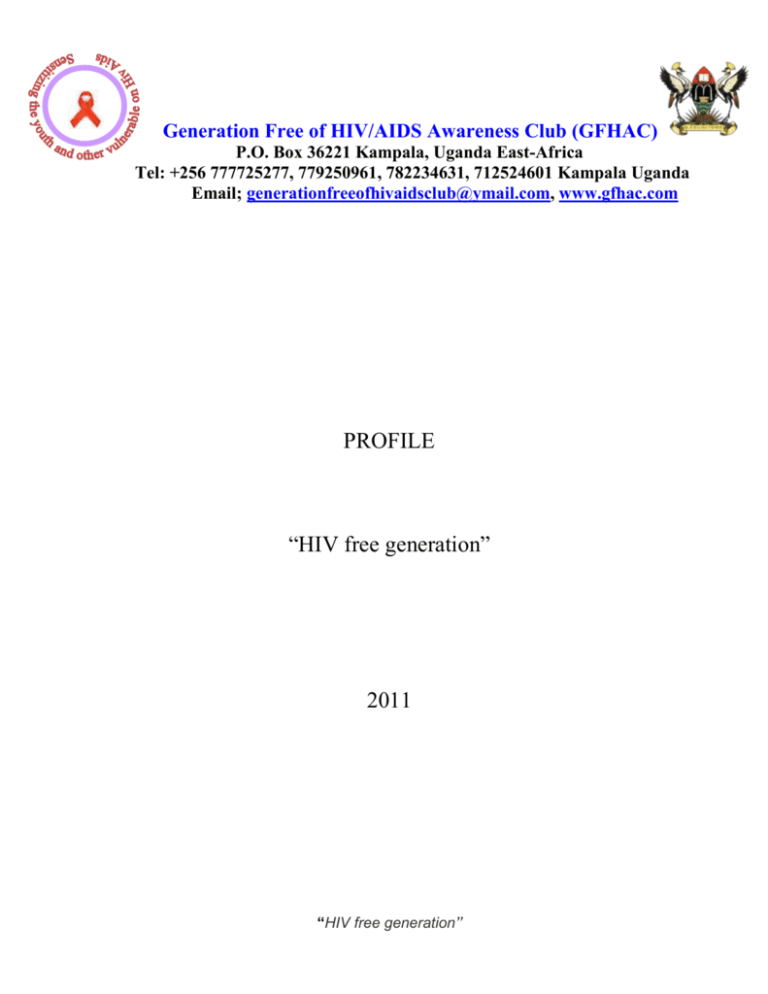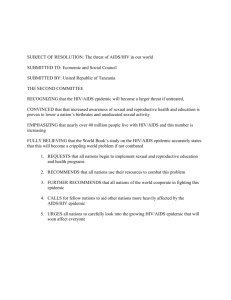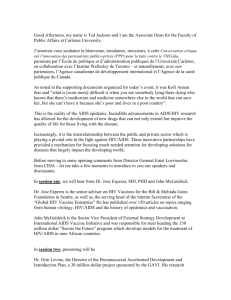
Generation Free of HIV/AIDS Awareness Club (GFHAC)
P.O. Box 36221 Kampala, Uganda East-Africa
Tel: +256 777725277, 779250961, 782234631, 712524601 Kampala Uganda
Email; generationfreeofhivaidsclub@ymail.com, www.gfhac.com
PROFILE
“HIV free generation”
2011
“HIV free generation’’
BACKGROUND
Generation Free of HIV/AIDS Awareness Club (GFHAC) was founded on 5th August 2010 by a group of students
and some Staff from the College of Agricultural and Environmental Sciences with the objective of evaluating the
impact of the extra curriculum approach and identifying strategies which could be used to institute HIV/AIDS
sensitization strategies into the mainstream curriculum in Uganda. This club was founded so as to create a
network among University students, Secondary students and Local communities hence promoting a culture of
togetherness. Our main focus is to carry out sensitization and research on matters of HIV/AIDS awareness and
other related STD’s infections. To create forums for adult education in rural areas to prevent HIV/AIDS
It’s currently located at College of Agricultural and Environmental Science and operates with and outside
Makerere University and out reach programs to the community and the rest of Uganda are in progress.
JUSTIFICATION
HIV/AIDS education has been taught for some time in Ugandan secondary schools through a variety of
extracurricular means, including the media, youth groups, drama, music, and Parent-Teacher Associations. But
these approaches have not achieved much as many schools ignored them, being extra curriculum. Packaging and
dissemination of HIV/AIDS awareness raising information in the normal curriculum may achieve much more
than it has been through the extra curriculum approach. This formed the basis for formation of Generation Free of
HIV/AIDS awareness Club (GFHAC).
Evidence shows that an effective response to HIV and AIDS requires a strong and visionary leadership. Strong
and committed leadership can inspire action, mobilize resources, establish policies and set up responsive
organizational structures (see also Kelly and Bain, 2005). In instances where institutional leaders have made HIV
and AIDS a priority, the response has been immediate, effective and visible.
In higher education institutions leadership that comes from Vice Chancellors or a designated senior manager
sends a strong message within the institution and to the wider community that HIV and AIDS management is a
priority. A recent study on the response of teacher training colleges (TTCs) to HIV and AIDS demonstrated that
when institutional heads provide leadership in HIV and AIDS, college communities are likely to take such
activities more seriously (Nzioka, 2006).
One example is the University of Durban, now known as the University of KwaZulu-Natal, where strong
response began in the late 1990s under the leadership of the Vice Chancellor. One outcome was the establishment
of what is now the internationally renowned Health Economics and AIDS Research Division (HEARD) under the
leadership of Professor Alan Whiteside. In institutions like this, decision-making and programme management
structures have been established, networks have been created, resources have been found and the climate of
silence and denial about AIDS has been broken.
The creation of the position of Chair in HIV and AIDS Education at the University of the West Indies, Barbados,
in October 2004 is yet another good example of how tertiary institutions can develop institutional leadership in
response to HIV and AIDS. This Chair was created by the Commonwealth Secretariat, in partnership with the
United Nations Educational Scientific and Cultural Organization (UNESCO) with the aim of providing
institutional leadership on HIV and AIDS through education in the Caribbean. This was the first time an
internationally supported Chair in the area of HIV/AIDS and Education was created in a higher education
institution to highlight the critical role that higher education institutions can play in the response to HIV and
AIDS (Morrissey, 2005).
“HIV free generation’’
Strong and focused leadership is necessary to break the highly observable culture of silence on HIV and AIDS
and to help to acknowledge the threat to institutional functions and operations. Effective responses to HIV and
AIDS by top institutional leadership in tertiary institutions should:
• acknowledge that HIV and AIDS may have an impact on the institutions’ functions and operations;
• recognize that HIV and AIDS could undermine the quality and quantity of the training and educational
services offered;
• prioritize a careful and well co-ordinated response to HIV and AIDS;
• integrate HIV and AIDS into the institutional mission, while ensuring that HIV and AIDS – related
stigma and discrimination is addressed;.
• target all members of the institutional community including students, teachers/lecturers and non-teaching
staff;
• establish interventions that are both inward-looking (protecting the institution’s own functioning) and
outward-looking (serving the needs of the wider society).
WHAT WE DO
Generation Free of HIV/AIDS Awareness Club (GFHAC) brings leadership, building the skills, abilities and
resources of individuals, communities, local institutions, and societies to the fight against HIV and AIDS. At the
club we work in HIV prevention are seven guiding philosophies:
Engaging multi-sectoral organizations to combat the epidemic
Strengthening the skills, talents and resources of local communities through participatory technical and
organizational skills training
Working with communities to stem the spread of HIV
Targeting people and communities most at risk of contracting HIV
Developing and adapting technical and organizational skills training for people at all levels of education
and literacy
Effectively monitoring and evaluating programs
Documenting and disseminating best practices
The Club plays an active role in addressing the prevention, treatment, and support needs of people living with and
affected by HIV and AIDS, particularly those who are most vulnerable.
In many of our current programs, Generation Free of HIV/AIDS Awareness Club takes lessons learned from
nonformal and out-of-school education programs and applies them to formal education activities to improve the
quality and relevance of education. Experiential learning is replacing rote learning methods. Learning is taking
place outside the traditional classroom.
Generation Free of HIV/AIDS Awareness Club life skills education approach makes curricula more relevant to
the needs of students, whose grasp of material increases dramatically as it is directly linked to their everyday
lives. Learners acquire a range of everyday life skills necessary to live effectively in society, including: critical
thinking, decision making, social skills, and civic participation. They also learn more specific technical and
occupational-specific skills including how to set up and run small businesses or how to make use of sustainable
agriculture
methods.
“HIV free generation’’
To ensure students leave classes with the basic skills they need, trained teachers to use interactive and learnercentered approaches. Some out-of-school, or nonformal, programs serve as a bridge to the formal school system
allowing students to enroll in the formal school system at age-appropriate levels. GFHAC is also building new
alliances between communities, employers, teachers, and learners to ensure students leave with the skills and
resources they need for productive employment.
MISSION:
Educate the students of the higher institutions/Secondary Schools and the community on HIV prevention through
maintaining an open forum for AIDS discussion throughout the school year by creating monthly AIDS awareness
events.
VISION:
Achieve a generation free of HIV/AIDS community and in the fight against the disease in Sub-Saharan Africa.
OBJECTIVES:
To promote career guidance, counseling among students and Communities in the region about HIV/AIDS
To build a technical primary, secondary, tertiary and inter-institutional relationships to promote HIV/AIDS
education among the youth/ students.
To publish Magazines, periodicals, books and leaflets the association may think desirable for the promotion
of its goals and objectives on HIV/AIDS awareness.
Writing Proposals to generate funds to run the clubs activities
MAIN PRINCIPLES:
Transparency
Honesty
Professionalism
Respect for each other
Hard work and versatility
Togetherness/brotherhood
OTHERS
The following principles are our shared beliefs, which provide guidance about structure, processes and overall
conduct to all who join Generation Free of HIV/AIDS awareness Club.
Members have a voice and responsibility to participate in decision-making, and to develop and maintain an
accountable, transparent, responsive and sustainable alliance.
Members may organize activities consistent with the mission, vision and principles of Generation Free of
HIV/AIDS Awareness Club.
Members are committed to enhancing local understanding of the club and building local capacity to advance
the goals of the club at all levels.
Members have to be committed to sharing best and promising practices to advance the goal of the club.
Generation Free of HIV/AIDS Awareness Club promotes collaboration and open exchange of information,
ideas and learning in ways that are appropriate in the local, national and international context.
“HIV free generation’’
Generation Free of HIV/AIDS Awareness Club actively seeks the participation and /or partnership with
women, men their families and the communities, professionals and practitioners from diverse fields,
members of civil society, the private sectors,UN agencies, bilateral, donors and all sectors.
The Club values, inspires and works to recognize each member’s voluntary contribution to the goals of the
Club and connects local action with the larger vision.
Generation Free of HIV/AIDS Awareness Club respects, protects and encourages individual, gender,
cultural and social diversity.
Generation Free of HIV/AIDS Awareness Club is open for membership irrespective of caste, color and
creed by any individual or group agreeing to its mission, vision and principles and the unifying symbol of
the Club.
BOARD OF DIRECTORS
The board is comprised of a team of eminently successful entrepreneurs, academicians and professionals who
share their expertise and practical know-how in our programs and services. They guide the management team.
Assoc. Prof. Margaret Najjingo Mangheni
Col. Henry Masiko
Dr. J.S.Tenywa
Hafasha Alex
Mukasa Michael
(Patron)
(Patron)
(Board Member)
(Board Member)
(President)
+256-772-483803
+256-772-880292
+256-772-487404
+256-712-524601
+256-777-725277
ADVISORY BOARD
This serves as the advisory organ to the Club leadership team. Membership to the advisory board is limited to
carefully selected individuals, organizations and institutions who have distinguished themselves in the areas of
Health, Entrepreneurship, Educational and Professional achievement, including Policy Experts.
They are willing to offer their advice, counsel and insight to help the Club realize its mission and objectives, and
increase the beneficial impact of its programs and activities to the target population.
Dr. Jenipher Bisikwa
Dr. J.B. Tumuhairwe
+256-782-682334
+256-702-463092
ACHIEVEMENTS OF THE CLUB
Since the inception of the club a number of achievements by the club have been registered and these include;
initiating this HIV/AIDS club in Makerere University as the first of its kind, mobilising member of staff and
students to become part of the club and a total of over 180 members have been registered and willing to
participate in the club’s activities, Mobilisation of other stake holders and the communities in Uganda.
Tertiary or higher education institutions have an ethical and intellectual responsibility to set an example by openly
debating the issues surrounding HIV and AIDS and finding creative responses to this epidemic. These institutions
constitute one of the essential components in developing a united and effective country response to the pandemic
for the following reasons:
“HIV free generation’’
• These institutions cater for sexually-active young people, mostly in the 18-30 year old category. Global
data shows that more than a third of all people living with HIV are under the age of 25 (UNAIDS, 2004).
• Certain aspects of social life place members of tertiary and higher education institutions at risk of
contracting HIV. Enhanced personal freedom coupled with the attractions and pressures of life in tertiary and
higher education institutions is a recipe for sexual activity and experimentation. Casual sex and multiple sexual
partnerships are common. Instances of offering sex in return for favours like promotions or good grades – which
are euphemistically termed as ‘sexually transmitted degrees and diplomas’ – exist in some of these institutions.
Commercial sex may not be uncommon as poor students seek to earn money to pay for their fees or for personal
upkeep.
• Campuses are places where the safety of all students and staff, especially women must be guaranteed.
Nevertheless, some university residences have earned a reputation as being places where rape, sexual violence
and harassment of women are commonplace and where unprotected sex is perhaps the norm.
• These institutions have a responsibility to ensure that all trained graduates have the capacity to deal with
HIV and AIDS at their own individual and professional levels.
• These institutions have an obligation to cater for the welfare of their members by creating an
environment that reduces the likelihood of HIV transmission.
• HIV and AIDS can seriously impair and undermine the operation and functioning of tertiary and higher
education institutions. Often, it takes particular talents, resources and a lot of time to produce specializations in
particular academic disciplines. Subject specialists in tertiary level institutions cannot be interchanged easily, as
may be the case in other school levels. Even where skilled manpower exists, the process of staff recruitment to
replace other staff lost to HIV and AIDS is expensive both in terms of time and resources.
• Higher education institutions have a responsibility to promote gender sensitization and awareness of the
situation of women with respect to the epidemic and the larger society.
Tertiary and higher education institutions can contribute to more effective, expanded and sustained responses
to HIV and AIDS. These institutions can assist
ACTIVITIES
The club involves and encourage students and the community in the following activities as we make the public
aware our objectives. These include;
Debates
Quiz
Sports
Drama
Talent shows
Musical concerts
CLUB RULES
Because the issues surrounding HIV/AIDS are often difficult and personal, the club established rules to protect
people’s feelings and privacy and to recognize everyone’s opinions.
Some suggestions follow:
· Treat each other with respect.
· Maintain confidentiality.
“HIV free generation’’
· Be open-minded and non-judgmental.
· Give everyone a chance to speak.
We also offer additional information, materials, and support to registered AIDS Awareness members.
Avoiding AIDS is about respect
You respect your body - you refuse to expose it to HIV.
You respect your future - you refrain from sexual intercourse or always use condoms correctly.
You respect your partner - you always accept their “no” without arguing or saying bad things against them.
You respect yourself - you don’t need to have sexual intercourse to prove that you are a man or woman.
You respect your own achievements and importance - you don’t get upset when someone turns you down.
You respect your own time table - only you, and not your friends or your families know when you are ready
to start having sexual intercourse.
You respect your friends - you don’t need to boast about sexual intercourse to them or pressurize them into
having sexual intercourse.
You respect your family and your religion – you know what you believe and you stick to it.
PARTNERS TO COLLABORATE WITH IN SERVICE DELIVERY
The partners will help the Club with their services they render to the community and when ever possible fund
some activities of the club. These partners include;
Uganda Aids Commission
Baylor College of Medicine
White Ribbon Alliance
Global Health Initiative
Global Village Network
Alleviate Poverty through Education Uganda
Labour Ward Foundation Uganda
TASO-Uganda
Reproductive Health Uganda
Aids Information Centre – Uganda
Uganda Red Cross Society
SERVICES TO THE COMMUNITY
Capacity building through providing knowledge, skills and as well as training the Youth on ways of
reducing chances for HIV/AIDS transmission
Community Mobilization for HIV counselling and testing as well as care
Sensitisation of the community on the way of reducing mother to child HIV/AIDS transmission
Educating the community on food security and nutritional support of the infected or exposed individuals
provided resources are mobilized for this program
Advocating for and influencing the policy makers to increase their support to prevention, care and
treatment of HIV/AIDS among the youth and the community at large
“HIV free generation’’
Partnering with other organisations with HIV/AIDS programs so as to increase service delivery especially
to the rural communities in Uganda and the rest of the world.
PROJECTS AND PROGRAM EVALUATION
Our experts provide program and project evaluation services to clients in a wide variety of situations. We
focus on program or project effectiveness. We understand the need in program/project evaluation for the
application of consistence and sound principles and guidelines. We are familiar with the principles and
guidelines set out by the Ministry of Health, higher and lower local governments and development partners
DEVELOPMENT SERVICES AND PROGRAMS FOR THE CLUB
Prevention
Care for people with HIV/AIDS
Care for children affected by HIV/AIDS
Patriotism in fighting HIV/AIDS in Institutions
Working together
Public education
Here are some of the methods adopted by the club for public education:
Talks.
Workshops
Plays, songs and music
Community meetings
Door-to-door
Pamphlets.
Radio/newspapers
Condom distribution
Promoting openness and awareness
Counselling and testing
Special youth focus
Entrepreneurs Forum
The Schools Business Idea Challenge.
The Annual Inter University Entrepreneurship Conference.
Micro, Small and Medium Enterprise Development Initiative.
Enterprise Start Program:
Networking Opportunities;
END
“HIV free generation’’






